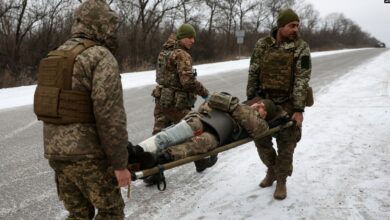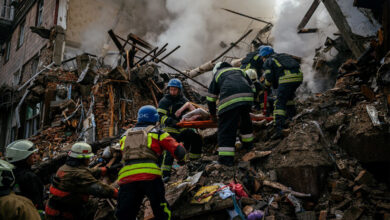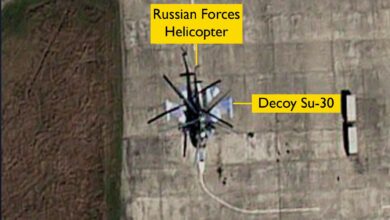
The US policy supporting Ukraine is tough-minded while avoiding escalation that brings the US into direct confrontation with Russia.
President Joe Biden rightly wants to avoid direct war with Moscow. But we cannot succumb to Vladimir Putin’s nuclear blackmail. If he gets away with it, where does he stop? What if he threatens to nuke Estonia or Poland unless all NATO troops withdraw from those areas? Or they refuse to exit NATO? Are we supposed to back down?
Deterrence failed to prevent Putin from launching a war. We should try to deter his first use of a nuclear weapon. But what if Putin uses one?
Fortunately, asymmetric options exist to send the right message to Putin and punish him within the boundaries of the Law of Armed Conflict without us using nuclear weapons.
This applies to any use by Putin of a weapon of mass destruction such as a chemical weapon. One war crime does not justify a second. We need a proportional response that seeks to avoid civilian casualties.

Non-Kinetic Reaction
First, we have non-kinetic options. Aggressive information warfare can undermine Putin’s domestic base, as it undermined the Warsaw Pact regimes in the 1980s. That prospect terrifies Putin.
Technological warfare can disrupt Russian internal financial and SKADA systems. Remember how the Stuxnet virus crippled Iranian centrifuges in 2010? While a “use of force” within the meaning of UN Charter Article 2(4), the attack did not kill or injure anyone.
Diplomatic warfare in Central Asia, supplemented by economic incentives, can detach Central Asia’s regimes and economies from Russia.
Collective Warning
Second, the West should collectively warn that we would retaliate. We have to mean it.
President Barack Obama’s failure to enforce the red line against Syria’s use of chemical weapons in 2013 convinced Putin that the West would fold when the chips are down.
Our warning could publicly identify pre-selected targets. The criteria should be to minimize civilian casualties while striking Russian troops, especially its battlefield leadership. The Ukrainians have proven adept at eliminating Russian generals, but more generals are on the way.
Existential Threat
Third, If Putin sees an existential threat to Russia, he may resort to the nuclear option. What qualifies as such a threat is unclear.
Matters may come to that if our supply of heavy weapons to Ukraine, combined with Ukraine’s skill and determination, destroy the invading force riles Putin enough.

We cannot dance around the challenge. What are our options should Putin use a nuke against Ukraine? Nuclear retaliation seems intolerably risky, and Russia committing a war crime does not justify the West doing so.
It’s not clear that he would necessarily detonate a nuke inside Ukraine. General Mark Kimmitt has suggested that Putin might set one off outside Ukraine for demonstrative effect.
Yet allowing a Russian first use inside Ukraine is unacceptable. Still, depending on the facts, we should avoid using nuclear weapons.
Asymmetric Options
What asymmetric options make sense? We could enable Ukraine to sink Russia’s entire Black Sea fleet, which contains troop carriers bearing Russian marines. These would have no civilian casualties. That may be the most forcible response.
Russia is massing forces near Izyum. We could destroy those formations. These seem sound, actionable options.
Should the US carry out the retaliation? Enabling Ukraine to do so keeps NATO from directly fighting Russia. That seems prudent. Still, since using a nuke changes the dynamics, the US or – if it could secure NATO support, which is unclear – might do it directly.
Either way, Putin must understand that there’s zero toleration for his using nukes. Any Western response should be confined to within Ukraine or against the Black Sea fleet.
Latest Defence Intelligence update on the situation in Ukraine – 28 April 2022
Find out more about the UK government's response: https://t.co/kGpbSP2o7L
🇺🇦 #StandWithUkraine 🇺🇦 pic.twitter.com/PKEHRgHGJ6
— Ministry of Defence 🇬🇧 (@DefenceHQ) April 28, 2022
Western Diplomatic Power
We should also apply our collective diplomatic power to force a vote at the UN Security Council, the General Assembly, the EU, and other organizations capable of reputable legal actions to condemn a Russian first use of a nuclear weapon.
Even though Russia would veto a Security Council resolution, contemporary conflict is about information warfare as well as kinetic operations.
Let’s remember: China is watching. We suspect that, like Putin, the united Western response and its ferocity have surprised Chinese President Xi Jinping. China seems fond of pronouncing the West as yesterday’s history. The Ukraine conflict has been a wake-up call.
The use of any weapon of mass destruction by any side in Ukraine would set back the prospects for global stability. But Russian use of a nuke would leave us with no choice. Unless we make it hurt, he’ll be back.
 Lt. Gen. Dell Dailey (ret.) was commander of the Joint Special Operations Command, among other commands, and headed the State Department’s counterterrorism office.
Lt. Gen. Dell Dailey (ret.) was commander of the Joint Special Operations Command, among other commands, and headed the State Department’s counterterrorism office.
He is currently the president of a family-owned consultant company. This enterprise is the culmination of four decades of government service. Dailey and his family support the US Special Operations Command through several companies and by continuous contact with the leadership.
 James Farwell (@JamespFarwell) is an Associate Fellow in the Dept of War Studies, King’s College, Univeristy of London; non-resident Senior Fellow at the Middle East Institute; Senior Fellow at the Institute for BioDefense Research; Board of Editors, Defence Strategic Communications (the NATO peer-reviewed publication).
James Farwell (@JamespFarwell) is an Associate Fellow in the Dept of War Studies, King’s College, Univeristy of London; non-resident Senior Fellow at the Middle East Institute; Senior Fellow at the Institute for BioDefense Research; Board of Editors, Defence Strategic Communications (the NATO peer-reviewed publication).
Has advised the Department of Defense, USSOCOM, USSTRATCOM, and other USG entities.
Author of Persuasion and Power: The Art of Strategic Communication (Washington: Georgetown U. Press, 2012); The Pakistan Cauldron: Conspiracy, Assassination & Instability (Washington: Potomac Books, 2011); Information Warfare: Forging Communication Strategies for Twenty-First Century Operational Environments (Quantico: Marine Corps University Press, 2020); The Corporate Warrior: Successful Strategies from Military Leaders to Win Your Business Battles (Rothstein Publishing, 2022); and numerous articles and commentaries in Parameters, Strategic Studies Quarterly, Survival, National Interest, and Defense One, among others.
The views and opinions expressed here are those of the author and do not necessarily reflect the editorial position of The Defense Post.
The Defense Post aims to publish a wide range of high-quality opinion and analysis from a diverse array of people – do you want to send us yours? Click here to submit an op-ed.










